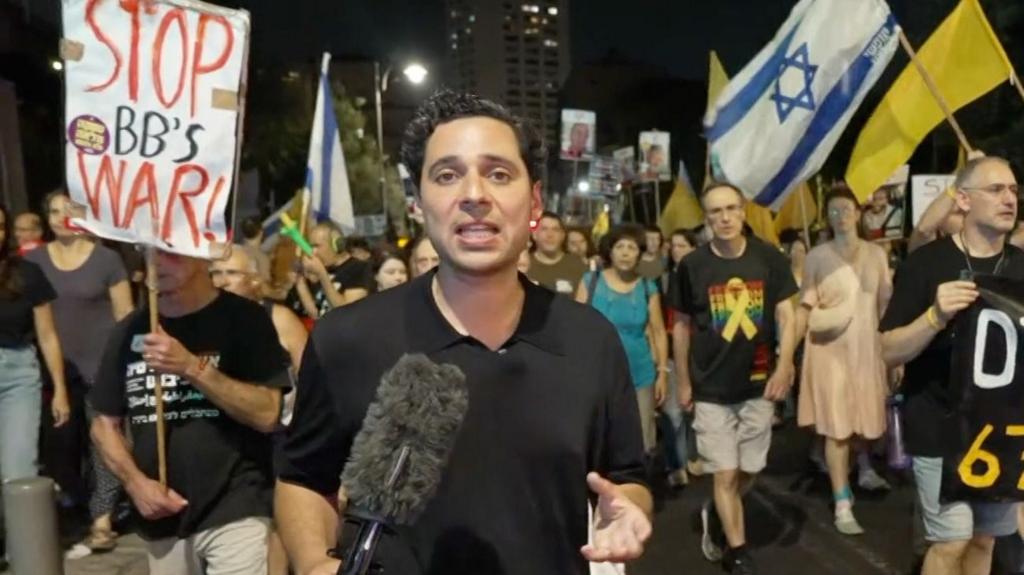Demonstrators advocating for the release of hostages gathered in Jerusalem, marching towards Prime Minister Benjamin Netanyahu’s residence to express their discontent with the Gaza City takeover plan.
Max Kresch, a former soldier, joined the march holding a sign that read “I refused”.
Speaking to the BBC’s Emir Nader, Kresch stated, “We represent over 350 soldiers who served during the war and are refusing to continue serving in what we see as Netanyahu’s political war.”
Protests also took place in other Israeli cities, including Haifa. Thousands assembled in Tel Aviv as well.
Israel’s decision to escalate its military operations in Gaza has drawn condemnation from the United Nations and several nations, including the UK, France, and Canada. Germany has responded by suspending military exports to Israel.
The plan, sanctioned by the Israeli security cabinet, outlines five “principles” for ending the conflict: the disarmament of Hamas, the return of all hostages, the demilitarization of the Gaza Strip, the establishment of Israeli security control over the territory, and the creation of “an alternative civil administration that is neither Hamas nor the Palestinian Authority.”
Government forces report that Suweida city is currently too dangerous for journalists and aid convoys to enter.
Lyse Doucet reports on a mass state funeral held for prominent figures killed in the recent conflict with Israel.
The BBC’s Lyse Doucet reports from the wreckage of an Iranian state TV building that was struck during the conflict with Israel.
Mark Rutte appears to endorse the US president’s forceful language when Trump addressed the warring nations on Tuesday.
Lyse Doucet reports from Tehran, noting a gradual return to normalcy.
The US president voiced his disapproval of the actions of both nations.
Israeli officials report that at least four people were killed when an Iranian missile struck a residential building.
Footage has emerged showing smoke rising over Tehran and the city of Karaj, located west of the capital.
An Israeli minister tells the BBC that his Prime Minister and the US President have been collaborating “from day one”.
The missile reportedly struck near a power station in the city of Ashdod.
The mission required months of planning and involved over 125 aircraft, a submarine, and 14 “bunker buster” bombs. BBC Verify details “Operation Midnight Hammer,” the US mission.
The BBC’s world news correspondent, Joe Inwood, addresses three key questions following the US strikes in Iran.
Emergency responders rushed to clear debris from the site of an Iranian missile attack in Tel Aviv.
The BBC’s Lucy Williamson is stationed outside Soroka Hospital in Beersheba, southern Israel, as emergency workers assess the scene.
Israel’s Prime Minister has long cautioned that Iran is nearing the development of nuclear weapons. BBC Verify’s Ros Atkins provides an overview of what is known about Iran’s nuclear program.
Iran’s Fordo nuclear site is among the most heavily fortified in the world. Only one conventional weapon is capable of destroying it, and the US is believed to be the sole possessor of that weapon.
Videos circulating on social media depict long lines for fuel and traffic congestion as residents attempt to leave Tehran.
The BBC’s Middle East correspondent, Hugo Bachega, is reporting from Petah Tikva, where an Iranian missile struck a building overnight.
According to Israel’s national emergency service, five people have been killed and dozens injured.
Footage from Reuters news agency and The Associated Press shows burning vehicles following a missile strike in the Israeli city of Haifa.

